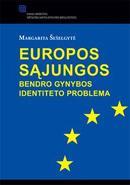
Original title: Europos Sąjungos bendro gynybos identiteto problema
Publishing date: 2007
Publisher: Vilniaus universiteto leidykla
Language: Lithuanian
Pages: 251
Description:
The monograph aims to determine whether EU is able to form single defence identity. Empirical EU defence identity analysis has been performed based on constructive international relationship perspective. Social constructivism theory by A. Wendt formed theoretical basis of the monograph. The choice is grounded by an opinion that traditional positivistic international relationship perspectives do not provide theoretical instruments for identity research. […] Social constructivism, differently from other post-positivistic trends, does not completely deny positivistic ontology, causal interpretations, or theory testing importance. This enables forming and testing scientifically grounded hypothesis. Based on constructive international relationship paradigm, theoretical part of the work purifies definition of identity. Single defence identity shows that states, with such identity, have single and consistent understanding of strategic and military culture as well as that of their role in using military instruments in international arena. EU single defence identity is formed both systemically (i. e. by the EU) and individually (i. e. by Member States), Therefore the monograph performs research in two levels. First, it analyses variable measures in the EU level, then in Member States. It analyses such countries which strategic cultures and attitudes are known as mostly distinctive, they are: UK, France, Germany, Sweden, and Poland. One of the most important findings is such that EU opportunities to have single defence identity are limited due to different understanding of EU international role in Member States.
Cite as: Šešlgytė, M. (2007) Europos Sąjungos bendro gynybos identiteto problema. Vilnius: Vilniaus universiteto leidykla.







